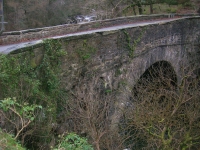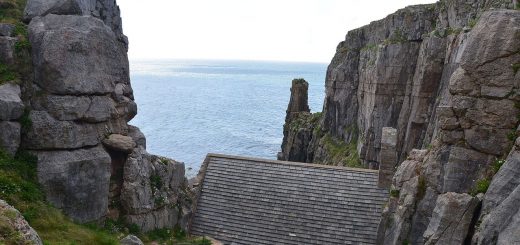Lludd (Llud) and Llefelys (Llevelys)
The earliest origins of this story are obscure, but it first appears in the twelfth century, when Geoffrey of Monmouth included it in his History of the Kings of Britain. Monmouth’s version was the basis for what is perhaps the best-known version, which appears in ‘The Mabinogion’, the collection of old Welsh stories compiled by Lady Charlotte Guest in the late 19th century.
After Beli (Belinus), the great king of Britain had died he was succeeded by Lludd, his son. Lludd was a wise and fair ruler; he strengthened the city of London (which was named for him) and created wealth for his people. Lludd was one of four brothers but he was fondest of his brother Llefelys, who had married the late King of France’s daughter and now ruled France.
Some years after Lludd inherited the kingdom, three plagues devastated the land and its peoples. The first of these plagues was the invasion of the Coranieid, a tribe with magical powers. The Coranieid’s greatest power was that of hearing; they would hear every word that was borne on the wind, so that there were no secrets, and every affair was their knowledge to use to their advantage. No one could create plans to defeat them for even whisperings would be heard. They also used magic in business; their money was the money of fairies, for it seemed real enough when first it was held, but soon after turned to earth, leaves and mushrooms.
The second plague took the form of a hideous shriek, heard throughout the land on each and every Beltaine’s Eve, striking everyone with fear and foreboding. The source of the shriek was unknown. Some who heard the terrible sound were so affected that they could no longer hold good in the matters of men.
The third plague struck deeply at the person of the King himself. Food from the royal stores began to disappear without trace. The thief could not be caught and no matter how they watched, when the King’s men checked the stores each morning more food had disappeared.
These plagues continued without respite and no man remained untouched by them. At length Lludd was advised to seek the counsel of his brother in France. His brother Llefelys was wise in the ways of the land – and also in magical arts. So Lludd set sail, in secret, with a body of men, to meet Llefelys in the channel. Llefelys knew that they could not talk in the usual way, as the Coranieid would hear every word on the wind, but he had devised a way in which they could speak in secret. He had his metalsmith fashion a tube of Bronze, similar in shape to a hunting horn – so that his advice to his brother would not fall on the wind and be carried back to Britain and the Coranieid.
When Lludd and Llefelys first began to converse through the tube, everything they said was heard by the other as a garbled insult. Realising that a demon sat in the tube, Llefelys quickly flushed it out with a draught of wine, and at last the brothers could talk in secret.
Llefelys told Lludd that the first plague, the Coranieid, could be defeated by a special poison, made from crushed insects, which would kill the Coranieid but cause no harm to the native population. The insects were not native to Britain, but Llefelys gave his brother a good supply and directed him to mash them and mix them with water to form a spray. This way, the Coranieid would be defeated and the people freed.
[img_assist|nid=844|title=|desc=|link=none|align=left|width=280|height=204]The second plague, explained Llefelys, was the noise of two fighting dragons; one native to the land, the other an invader. The battle between them was endless, and although the native dragon resisted the attack with great strength and fortitude, every May Eve he screamed in pain and fury, striking fear into the hearts of men.
Llefelys told Lludd precisely how to cure the plague. “You must return to Britain and gather all your scholars, and tell them to make a mathematical survey of the land, to measure it in length and breadth, and in this way to find the very centre of the country. Go to that spot and dig a deep pit, and place in the pit a large cauldron of mead covered with a cloth of pure silk. Stand guard at the edge of the pit, and you will see dragons fighting in the sky, but at last they will drop exhausted – in the form of piglets. They will fall onto the silk cloth and sink into the mead, which in their thirst they will drink dry. When they fall into a stupor, wrap them in the silken cloth and put them in a solid stone chest, which you should have in readiness nearby. Then bury them, beneath stone, in the strongest fortress in the kingdom.”
Llevelys next explained the third plague. This, the constant disappearance of food, was the work of a giant with magical powers. Every evening he cast a spell over the guards on duty and crept in to steal food. Lludd was told to guard the stores himself one evening, but keep beside him a tub of icy water, in which to douse his head if he became sleepy. Then he would be able to fight the giant and defeat him.
Lludd thanked his wise brother and returned at once to Britain to carry out the three tasks. First he pulped the insects into a mixture, called a conference of all his peoples and then sprayed them with the substance. The Coranieid amongst the crowd fell about in agony and quickly died, but, as his brother had promised, his own people suffered no distress.
Secondly Lludd made a survey of the kingdom and found the centre to be in Oxford. So here it was that he set about making the trap. Just as Llefelys had predicted, a red dragon and then a white dragon appeared in the sky. They fought and eventually dropped exhausted – in the form of piglets – onto the silken cloth. They sank into the mead, drank thirstily, and when finally they lay still, Lludd had them bound and placed in a stone chest. He had the chest securely buried, beneath a mountain in Snowdonia, and there they remained until Vortigern tried to build a fortress on the land.
Next, Lludd dealt with the giant. He ordered a huge feast to be prepared and then waited as his men enjoyed the revelry and at last began to slip into slumber. Lludd would have slept too, but each time he felt his eyes close and his body grow heavy, he plunged his head into the vat of icy water at his side. Shocked awake, with all his men sleeping around him, he saw a heavily armoured giant of a man push his way through the oak doors of the hall. In his muscled arms he bore a huge basket, which he quickly began to fill with all the food still lying on the tables. As Lludd watched, the basket seemed to expand with the food until every morsel was cleared from the hall.
Then the giant turned to leave, but Lludd ran after him, causing the giant to drop his basket and give battle. The two fought ferociously, sparks flying from their sword strikes on the hard armour, but it was Lludd who landed the heavier blows and at last the giant begged for mercy. Lludd made him swear that he would make good for all he had stolen and henceforth to be loyal to his King and his King’s subjects. The giant swore fealty and so the last of the plagues was cured.
Peace was thus restored to the land, and Lludd continued to be a wise ruler. He is remembered today in the name of Ludgate, in London. At this place Lludd’s Gate stood, a great arched gateway which survived until the Great Fire, in 1666.




Recent Comments